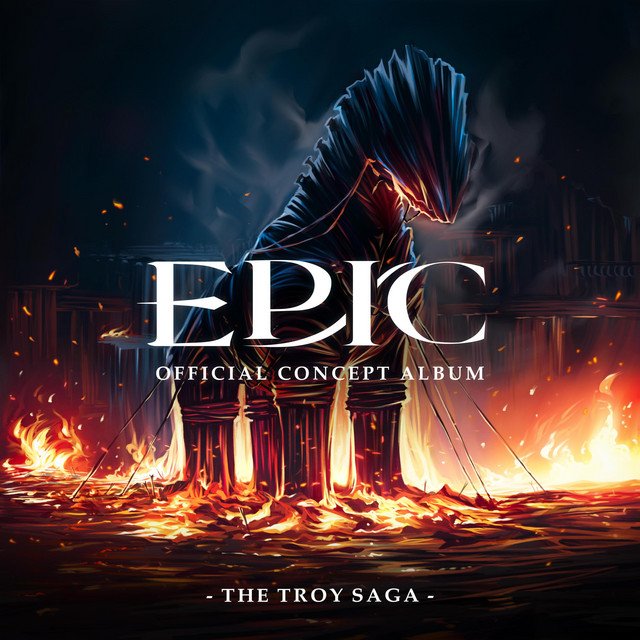Epic: The Musical, written and produced by Jorge Rivera-Herrans, recently ended in December 2024, leaving fans, myself included, reminiscing about the musical’s electrifying soundtrack and unforgettable storytelling. This unique adaptation of the Odyssey was developed and produced on online music platforms and social media, never gracing the stage and yet managing to captivate musical theater fans worldwide. Reflecting on the musical’s impact, I’m reminded of just how much I enjoyed it and its profound impact on theater.
I first came into contact with the musical in winter 2022. I stumbled upon a clip of the song “Just a Man” on TikTok and was hooked instantly. I soon found myself falling deeper into the Epic rabbit hole — not only listening to the songs but also learning about the process of creating the work. The musical was released episodically, with each album chronicling the journey of Odysseus, beginning with the Siege of Troy and concluding with his eventual return back to Ithaca. Odysseus’ journey was anything but easy, taking 20 years for him to reach home — lucky for us, that meant over two years of music being produced for the musical.
And it is truly wonderful music. Rivera-Herrans is a masterful composer, weaving musical motifs to create adrenaline-fueled songs while also crafting soul-crushingly beautiful ballads. I recommend you listen to “Wouldn’t You Like” and “Keep Your Friends Close,” upbeat and groovy songs which stay rooted in my brain, while “Warrior of the Mind” and “The Underworld” have me belting when my roommates aren’t home. A testament to his skill is the distinctiveness of the albums — each feels and sounds different, with standout songs and characters that make every release unforgettable. Fans eagerly awaited every new drop, and the first two EPs of Epic have generated over 200 million streams across platforms.
I was particularly taken by EPIC: The Circe Saga, which introduced Circe, the powerful goddess of magic and sorcery. Rivera-Herrans’ voice shines through as Odysseus, but he is also gifted at discovering incredible vocal talents, including Troy Dohert and Talya Sindel who play Hermes and Circe, respectively, and consistently blow me away with their unreal performances. Even the album’s villains are characters to take stock of as Poseidon (Steven Rodriguez) and Antinous (Ayron Alexander) had me questioning how bad characters could have such enchanting vocals. I often found myself debating my favorite songs, as it was impossible to pick just one that truly touched my heart. Each album stuck in my head, only to be outdone by the next release, with Jorge Rivera-Herrans firmly holding the title of my number one Spotify artist since last year.
Beyond its gorgeous music, what makes Epic so compelling is how it can be interacted with in many ways. When I first heard the musical it wasn’t through a traditional musical theater platform like Playbill or a theater’s social media — it was on TikTok, which made both the music and the creative journey behind the musical accessible in a way most musicals are not. This also translated to the casting process, as Rivera-Herrans held auditions via TikTok, allowing anyone — regardless of location or experience — to audition by duetting tracks posted by him. Musical theater is often exclusive, with education, experience, and location serving as barriers to many people’s dreams of being on stage. Rivera-Herrans took a different path, mirroring Odysseus’ journey by charting his own course. His work is rooted in accessibility, enabling everyone to feel a part of the musical’s journey. Not only is this a brilliant marketing strategy, but it also creates a stronger bond within the fanbase, as we’re all consuming the same media and experiencing it together — unlike traditional musicals, which offers some fans more access than others.
In this spirit of accessibility, the musical has expanded onto other popular forms of media. Hundreds of animatics — animated storyboards on YouTube — have been created to accompany the songs of Epic, allowing fans to engage with character designs, staging, and other visual elements that transcend the music alone. Rivera-Herrans has consistently mentioned that his music and storytelling are often inspired by video games, with each album referencing compositions that resemble video game soundtracks. This has led to countless videos imagining the musical as a stage production or even in game format. Additionally, fans have created fanfiction, formed Reddit and Discord communities, cosplayed, and role-played as characters from the musical, conveying a theatrical experience that is not only inexpensive but also incredibly entertaining. As someone who often critiques musicals for being inaccessible, I deeply appreciate how Epic fosters a community of theater lovers constantly finding new ways to connect with the story, music, and artists involved.
I stress the importance of treating this masterpiece as a musical rather than a TikTok trend or something less serious. While it presents itself differently — and in my opinion presents itself to the many rather than few — it should be given the same respect as any other musical starting out. It is no less valid because it is not heading to Broadway. If anything, it shows us that not all great musicals have to end up on 42nd Street.
To my dismay, Epic came to a close with the hauntingly beautiful ballad “Would You Fall in Love with Me Again.” Fans, including myself, are still engaging with and creating content inspired by the musical, wondering what Rivera-Herrans has in store next for the story or the new ideas he’s exploring. There’s been talk of a video game and potential ways the musical could be brought to the stage, but for now, we’ll have to wait and see. Regardless of what comes next, I find myself constantly paying homage to how far it’s already come. I hope that Epic is just the beginning of a new era of theater that challenges our traditional notions of what a musical can be. I eagerly await whatever comes next — though I hope I won’t have to wait 20 years!












